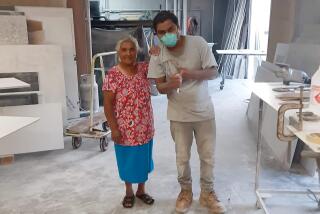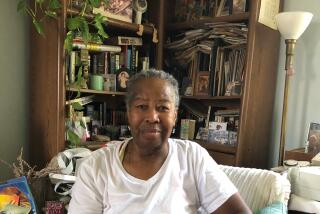Surgeon Says He Wasn’t Told of Valve’s Defects : Liability: Plaintiff would not have been given Shiley heart device implant if doctor had known of the mechanical flaws, he testifies in Santa Ana trial.
SANTA ANA — A surgeon who implanted a potentially defective artificial heart valve in a San Diego woman 13 years ago told an Orange County Superior Court jury Tuesday that the manufacturer did not tell him about mechanical failures in similar valves before he operated.
Marking the opening day of the first trial ever held on the controversial--and sometimes deadly--Bjork-Shiley Convexo-Concave Heart Valve, cardiac surgeon Joseph Verska told the 10-woman, four-man jury (two are alternates) that he would have given plaintiff Ruth Barillas a different artificial valve during her July, 1980, open-heart surgery.
“I was not aware of any mechanical defects,” Verska said.
Barillas, 55, is suing medical device manufacturer Shiley Inc. of Irvine and its former parent company, New York-based Pfizer Corp., in Orange County Superior Court in Santa Ana.
Shiley, which made and sold the Bjork-Shiley valve from 1976 to 1986, is accused of lying to the U.S. Food and Drug Administration about potential defects when it applied for approval to sell the valve and of concealing the heart valve’s fatal flaws to the medical community.
Though Barillas has lived for 13 years since the operation to treat an incurable case of congestive heart failure, she is claiming emotional and psychological stress because she does not know if the valve will malfunction.
She had little more than a week to live before she received her Shiley valve, according to testimony.
Barillas did not learn about the possibility of her Shiley heart valve malfunctioning until 1991, when she underwent open-heart surgery for an unrelated heart ailment. Her doctor at that time warned her that the Shiley valve may someday break, but was unable to replace it.
*
Since then, she claims that she cannot sleep and has been forced to seek help from a psychiatrist.
Her husband, Constantine Barillas, 66, a retired machinist, is also suing the company for loss of sexual relations with his wife, who claims that she can no longer exert herself for fear the valve inside her will crack.
Shiley attorneys argued, however, that the company has long been upfront in disclosing the potential for the valves to break.
They also defended the discontinued product, saying that it continues to be the best valve in existence for preventing blood clots from forming on artificial valves, a major problem in artificial heart valve technology that in itself can lead to death.
They also painted a picture of Barillas as a woman with a long history of medical and emotional problems who would have died long ago if not for the Shiley valve implant.
“Shiley gave her the gift of life,” said defense attorney Pierce O’Donnell. “She handed Shiley a lawsuit for fraud.”
The trial is meant to be a bellwether in the long-running Shiley heart valve case. While there have been about 300 individual and class-action settlements, Barillas is the first of at least six valve recipients scheduled to go on trial.
The jury’s decision in this case could set a precedent for all future decisions regarding the Shiley heart valve, which has generated one of the most heated controversies in the medical device industry in decades. Alarm over the case has even spurred FDA Commissioner David Kessler to scrutinize the approval process at the FDA’s Center for Devices and Radiological Health.
Cross-examination of Verska by O’Donnell is scheduled to continue today. Shiley spokesman Bob J. Fauteaux said that O’Donnell is expected to challenge Verska’s claim that he did not know about occasional fractures when he picked the Shiley valve over six others on the market at the time.
“It was the valve of choice for surgeons,” Fauteaux said. “Its benefits outweigh the risks.”
*
The small, quarter-size valve--which received FDA marketing approval in 1979, malfunctions when a tiny metal strut that holds a plastic flap in place cracks where it is welded to the valve’s outer frame.
To date, about 50,000 people throughout the world have a Shiley valve implant, with about 23,000 in the United States. As of January, 501 fractures had been reported to the FDA, and 164 of those people survived, attorneys said. Attorneys for Barillas estimate that Shiley valves malfunction at the rate of about 30 a year.
Barilla’s attorney, Ed Kellogg of Atlanta, brought Verska to the stand Tuesday to illustrate the allegation that Shiley had not properly informed heart surgeons early-on that some valves had malfunctioned during and after clinical trials. Clinical tests are conducted on medical devices such as the Shiley valve before the FDA considers them safe and effective enough to market.
In his earlier opening statement, Kellogg told the jury that there were three confirmed breaks of the valve--one of which occurred during clinical trials--before Barillas received hers. Central to his case is the argument that Shiley committed fraud by continuing to sell the device to doctors and not informing them.
Kellogg also argued that the company did not tell the FDA during its bid for marketing approval that there were 21 strut fractures in valves that were hooked up to testing machines.
“(Shiley) failed to note that the valves broke in the tests,” Kellogg said. “The proof was at hand. They knew about it and they ignored it.”
But defense attorney Jack Urguhart, who shared opening statements with O’Donnell, told the jurors that they would eventually reject the plaintiff’s claims once they had heard all the evidence at the trial, which is expected to last six weeks.
He described Shiley as a hard-working company that has been on the forefront of medical technology, creating a line of heart valves that have saved the lives of tens of thousands of patients who would have died of congestive heart failure if it were not available.
“They have labored at the frontier of medical technology,” Urguhart said during his opening remarks. “The innovation has saved her life and has sustained it. It has done its job--for 13 years.”
He acknowledged that the valve occasionally breaks, but added that 99.9% of them have worked well.
“While Shiley has not created perfection, it has created progress,” Urguhart said. “We once had a disease for which there was no hope.
“The plaintiffs say, ‘Don’t market a valve without problems,’ ” Urguhart continued. “If you hold us to that standard, we will not sell valves. You cannot move forward. You cannot attain benefits without incurring risk.”
*
During his opening statement, defense attorney O’Donnell added that Barilla’s emotional problems--the lack of sleep, tenseness and anxiety--were diagnosed by a psychiatrist before she knew the Shiley valve inside of her had been the subject of a recall.
“Her emotional problems . . . were caused by other factors,” O’Donnell said. “The truth of the matter is, Mrs. Barillas has had a hard life.”
A diary, written in 1991 by Barillas and obtained by The Times, offers a glimpse, however, of the pain and uncertainty she said she suffered after learning about the Shiley valve’s problems.
In February, 1991, a month before she was to undergo surgery to have the valve removed, Barillas wrote: “Bad News. I’m not feeling well and is (sic) almost sure that I need another surgery. I am so scared I don’t think I can take another surgery. The awakenings are painful, I just have to trust in the Lord that things will turn out OK.”
A month later, she found out that her heart had grown around the valve and the surgeon was not able to remove it.
“I should be happy that the surgery went well, but I learned that they were not able to change the Shiley valve,” she wrote while recovering at Scripps Memorial Hospital in San Diego.
“I am so disappointed about the news, I am trying to understand that the doctors did what was best for me,” Barillas wrote. “But I went to surgery with the assurance that I was going to have the recalled valve replaced. And now I know that I have to live with it and with the uncertainty that I may fracture one of these days.
“It is very scary.”
More to Read
Sign up for Essential California
The most important California stories and recommendations in your inbox every morning.
You may occasionally receive promotional content from the Los Angeles Times.










